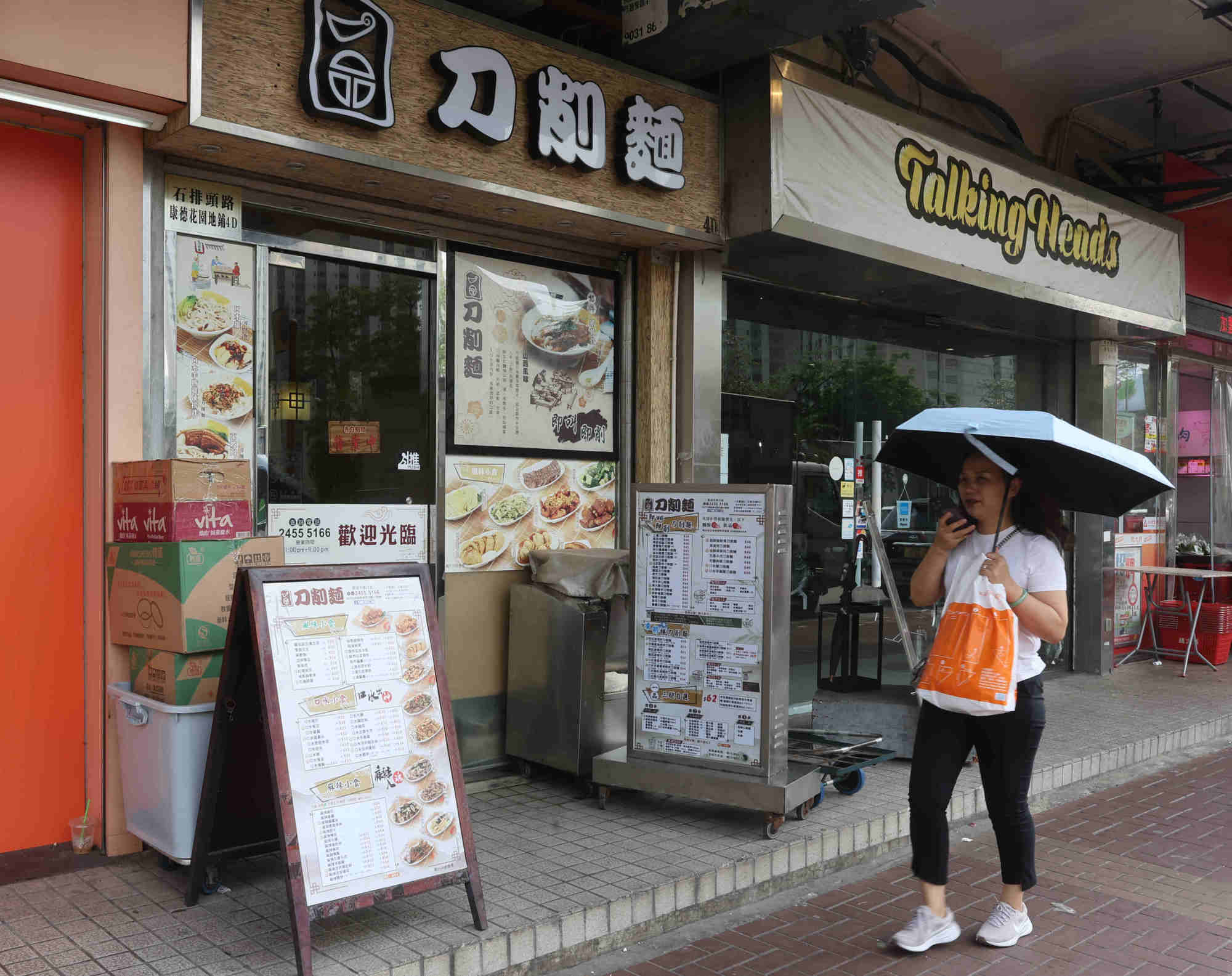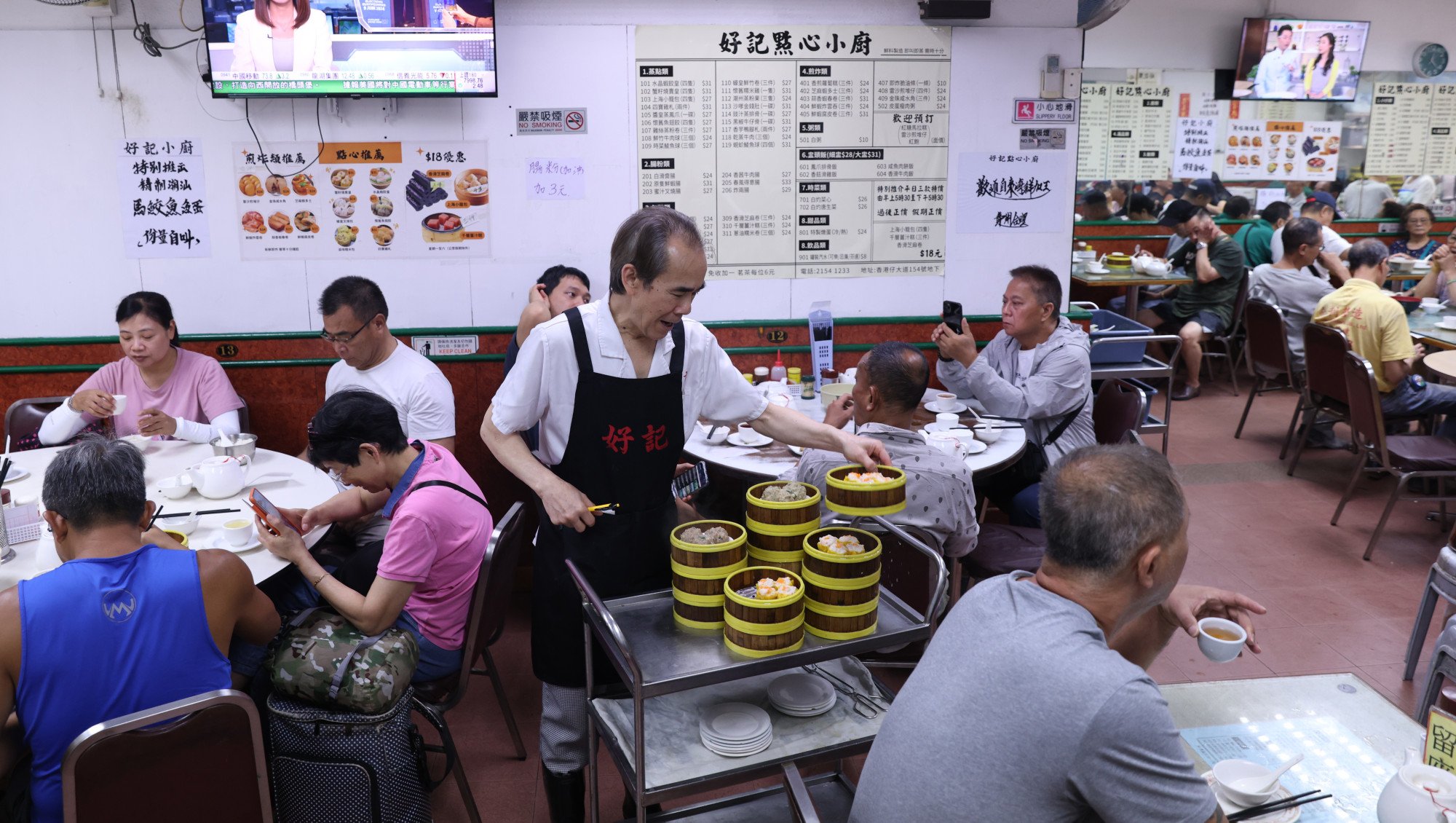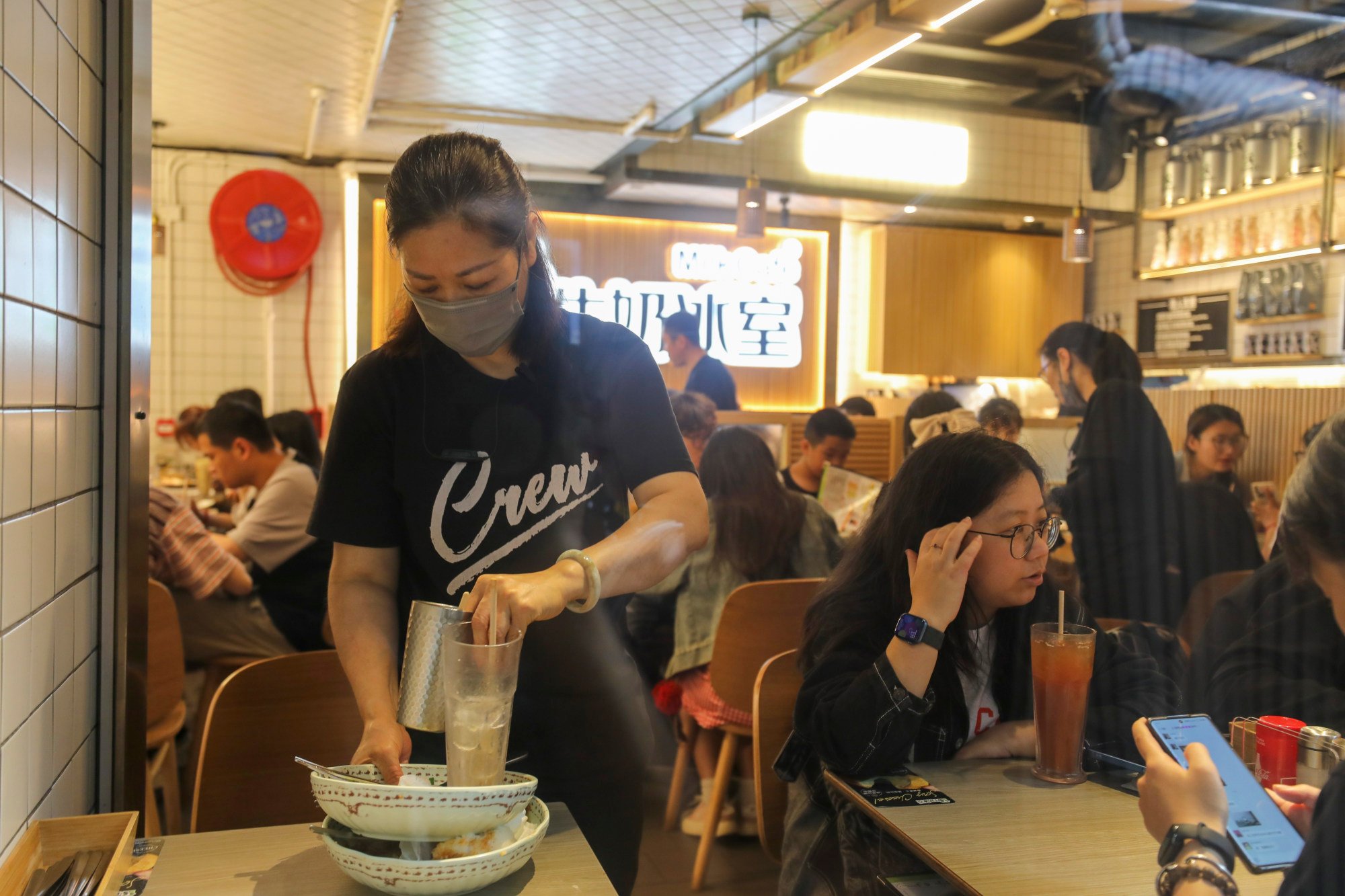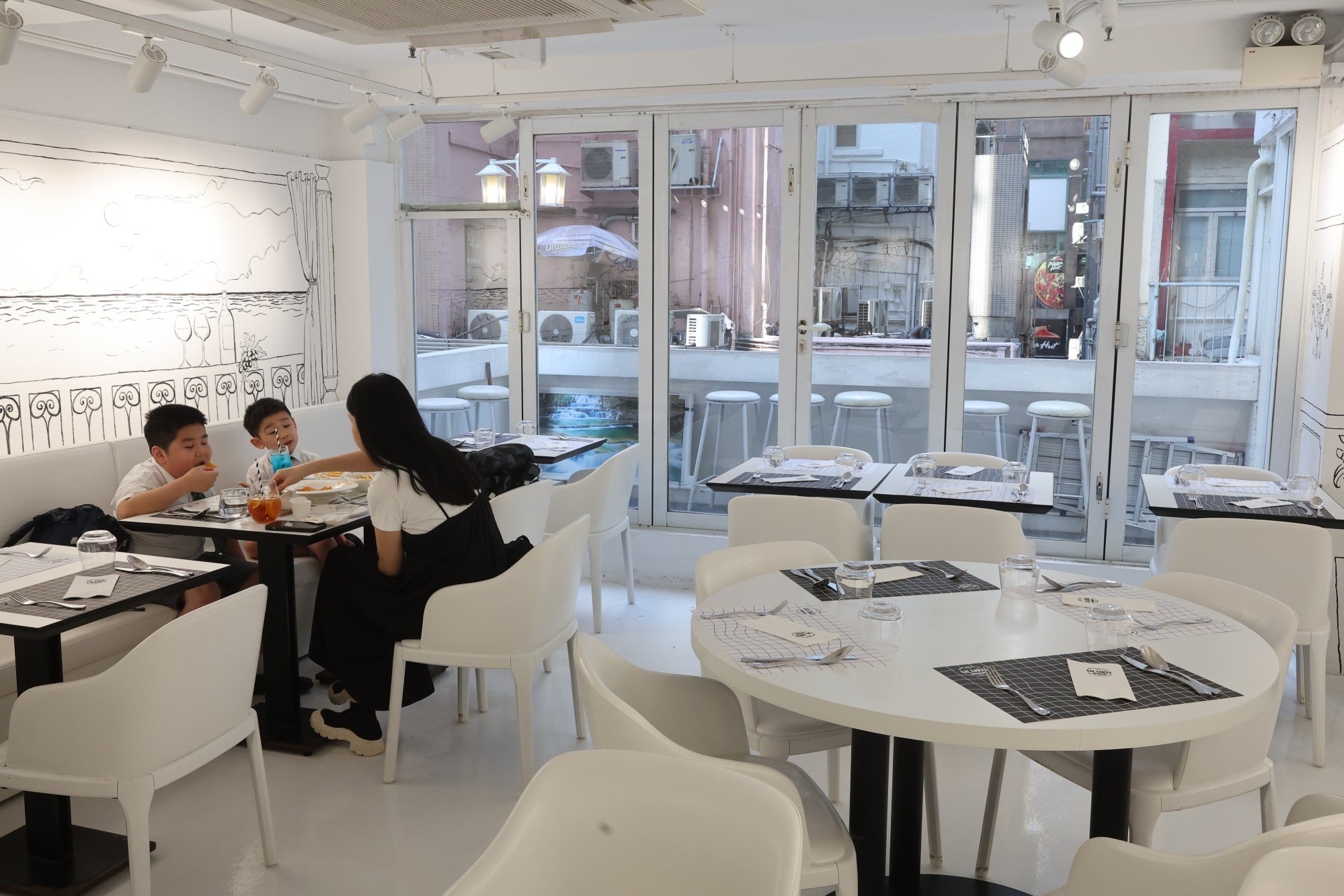
A Hong Kong noodle seller blows his top, and suddenly everyone agrees restaurant service levels have sunk, need improving
- Manpower crunch blamed for decline, with patrons saying they get better service when they travel
- No apology from restaurant that sparked debate, with owner saying some customers are just too much
At a small family-run eatery in Hong Kong’s Tuen Mun, co-owner Monkey Lo has found himself dealing with overnight notoriety and an outraged online crowd who wants his shop to close down.
A video clip shared widely last month showed the Yat Bun Noodle Restaurant’s chef – Lo’s younger brother Wai-keung – hurling abuse at a young woman who demanded to know why he had denied her boyfriend a student discount when the couple dined there the day before.
She had returned with a media crew from an online channel to confront the chef after he posted her boyfriend’s photo on social media, saying he doubted the young man was a student because he looked “suspicious” with his curly dyed hair.
The video showed him yelling at her: “This restaurant is mine and I have absolute say. I offer the student discount and I can deny it to you. You are just a diner and have no say.”

It went viral, chalking up more than 1.3 million views. It also showed the chef’s father using an umbrella to shove the young woman out of the restaurant.
Internet users condemned the chef’s rudeness, with some demanding the restaurant’s closure. The incident also sparked an ongoing debate about service quality in Hong Kong eateries, with many lamenting that it had declined to a sorry state.
Hongkongers said they were treated much better eating out across the border in Shenzhen, or when they travelled to Japan and Taiwan.
Even veterans in the catering and tourism scene agreed that service levels had suffered, not least because of a manpower crunch.
“I think Hong Kong really needs to wake up and address these problems,” warned entertainment tycoon Allan Zeman, chairman of the Lan Kwai Fong Group.
“If not, more restaurants are going to close down because people are turned off. They are going to Shenzhen and elsewhere in China to get excellent service at cheaper prices.”
‘Some customers have a bad attitude too’
At his noodle shop in Tuen Mun, Monkey Lo, 33, was unapologetic, although he conceded that his brother handled the situation with the customer inappropriately.
He felt the whole episode had been blown out of proportion and his brother felt cornered when the woman showed up with a media crew.
The small shop, with about 24 seats, sells different types of noodles and is run by the brothers and their parents.
“The incident affected our business and the damage is irreparable. But I don’t mind, because it has helped us make a decision to restructure our business,” he said, without elaborating on what would change.
Lo was also defiant, saying: “If our service was really that bad, we wouldn’t have survived for more than 10 years with a group of loyal customers.”

He said some customers had a bad attitude too. Some brought their own drinks, or shouted at the staff for not providing hot water to rinse their chopsticks.
“There’s a saying that the customer is always right, but I don’t agree with that,” he said. “Why don’t customers try to understand our difficulties – in a small outlet like this, how can we provide hot water to clean their chopsticks?”
He said he had been trying to hire workers, with no success, and his brother “exploded” that day partly because the shop was short-staffed.
“Without enough manpower and having to attend to everything and taking on the load of several workers, people will easily lose their temper,” he said.
Warning to patrons: ‘Eat fast, leave fast’
Elsewhere in the city, even well-known restaurants on tourists’ must-go lists have been criticised for poor service.
The rude service is almost legendary at the Australia Dairy Company, a traditional cha chaan teng or Hong Kong-style cafe, in Jordan, but that has not deterred long queues for its signature egg custard pudding and scrambled eggs.
“No one does eggs better,” gushed the Hong Kong Tourism Board on its website highlighting the city’s delicacies and popular eateries.
But it also carried this word of caution: “Whatever you choose, just make sure you order fast, eat fast and leave fast as there’s almost always a queue of people waiting.”
Customers are served quickly, but also get clear signals to finish up and go within 10 minutes. A company employee said it did not take inquiries.
Simon Wong Ka-wo, president of the Hong Kong Federation of Restaurants and Related Trades, was familiar with all that, saying he, too, had been told to leave after 10 minutes.

He said the overall service quality at restaurants had been declining mainly because of the shortage of manpower, even at high-end eateries, and widespread criticism on the popular mainland Chinese social media platform Xiaohongshu had put off visitors.
“I’ve received feedback from people from all walks of life,” he said. “They have come across the rude behaviour of frontline workers who pull a long face, ignore diners’ requests or tell you to leave after half an hour.”
Wong said this was happening not only at ordinary food outlets but also at high-end restaurants, and he had experienced it himself.
“The manpower shortage is the main reason. When one worker takes on the workload of three people, the pressure is great, and they easily throw tantrums and vent at customers,” he said.
Wong estimated earlier that more than 700 restaurants had closed in recent months, amid the trend of more Hong Kong diners heading across the border, and over 400 new eateries had opened.
He said about 20,000 mainlanders were expected to take up frontline jobs in the city’s catering industry under a scheme to bring in workers.
“They are all experienced workers in the service industry and hopefully, they will ease the manpower burden of restaurants,” he added.
‘Staff seem stressed and irritable’
That might be too little, too late as far as businesswoman Agnes Leung, 40, is concerned.
The owner of a public relations firm used to eat out regularly, frequenting the city’s high-end restaurants, but stopped after an unpleasant experience over a bottle of white wine at a mid-range Western eatery in Wan Chai last year.
“We ordered a bottle of Australian sauvignon blanc. Shockingly, the waitress brought a Chilean brand, asserting they were the same,” she said.
She said a defect at the edge of the table also caused a rip in her new Italian jacket.
“The terrible service continued when we were abruptly asked to relinquish our seat cushions as they were preparing to close,” she recalled.
She had no joy reporting the table defect to the waitress either. “She was unapologetic and impersonal, and simply said, ‘It’s not my fault. Give me all your cushions as we are closing’,” Leung said.

Like others who spoke to the Post, she felt service levels had slipped since the Covid-19 pandemic and thought it might reflect the lack of workers.
“Frontline workers appear very stressed and easily irritable,” she said.
As a regular visitor to places such as Japan, Shenzhen, Macau and Singapore, she said she now preferred saving her fine-dining for other Asian cities where prices were lower and the service, more pleasant.
“I don’t want the rudeness at local restaurants. For only a third of the price in Hong Kong, I can enjoy the same quality of fine-dining in Japan and even Shenzhen, which provides surprisingly thoughtful and courteous service,” she said.
Some go all out for customers
It has not been all bad news and brickbats for Hong Kong restaurants. Many also receive bouquets for good service, with a growing number gaining international recognition too.
Ricky Tam, owner of Uluru, a fusion restaurant in Wan Chai, received glowing praise after he invited students to use his 4,000 sq ft premises for three hours in the afternoon last month and threw in a free drink and a dessert too.
“This is the exam period for Hong Kong students and I understand it’s hard for them to find a place to study,” he said. “There is almost no business during those hours so I thought, why not offer the place for them.”

He had another reason for his kind deed. “The social sentiment is rather negative now with many people appearing unhappy. I hope to cheer the students up and provide them some positive energy.”
His five years in business had been challenging, but Tam said he was determined to carry on and hoped to maintain the human touch.
“I will avoid using a QR code for customers to self-order, which is devoid of human interaction,” he said.
Caspar Tsui Ying-wai, executive director of the Federation of Hong Kong Hotel Owners, insisted the city’s high-end restaurants still offered excellent service.
“If there was a decline in their service, there wouldn’t have been so many restaurants getting Michelin stars this year,” he said.
Seventy-nine restaurants received stars in the 2024 edition of the global gastronomic guide, with seven receiving three stars.
Tsui said the main problem for high-end outlets was the rising operating cost for items such as manpower and food.
“There is no problem with these restaurants’ service quality. Those who work there, such as chefs and waiters, all take pride in their jobs and won’t compromise their professionalism,” he said.
“The problem now is the rising cost. A lot of investors have backed off, causing some upmarket restaurants to close as they suffered a lack of profit.”
Catering staff need more training
Roberto Garrone, chief operation officer of Pirata Group, running a portfolio of 16 F&B brands in 26 venues including Pirata, The Optimist, TokyoLima, and Pici, said the restaurant scene was changing in Hong Kong and globally too.
The traditional idea of high-end dining guests lingering for hours had given way to shorter sittings of 90 minutes to two hours, with each course presented meticulously.
To maintain Hong Kong’s reputation as a gourmet paradise, he advised local eateries to focus on delivering “memorable experiences” to guests, by honing their staff’s professional skills to offer a welcoming and inclusive environment.
“As professionals in the hospitality industry, our primary goal should be to cultivate exceptional teams that are not only diverse but also well-trained in providing heartfelt and engaging experiences in a vibrant and enjoyable setting,” he said.
“By emphasising the importance of teamwork and continuous training, we can ensure that our staff members are equipped with the skills and knowledge necessary to deliver exceptional service to guests from all walks of life.”
Industry leader Simon Wong agreed it was necessary to step up training and said the trade would partner with the Employees Retraining Board (ERB) to roll out tailor-made courses for restaurant staff.
He also advised local workers to learn from their mainland counterparts who delivered better services.
“The interactions with patrons are very important. Local outlets can learn from their mainland counterparts about how to train and manage their workers,” he said.
The Tourism Board has also rolled out an eight-episode reality show as the first step to promote a citywide hospitality culture and quality services.
It said the Quality Tourism Services Scheme had put in place a new assessment by increasing the weighting of staff performance to recognise the importance of service qualities.

A spokesman for the Labour and Welfare Bureau said the ERB currently provided 50 courses related to catering to help the unemployed and eligible in-service employees obtain or upgrade their skills.
He said there were about 31,000 trainees in the 2023-24 financial year, and that the board had around 29,500 training places in 2024-25.
“The board will continue to work closely with relevant stakeholders … to provide suitable training based on the market demand,” he said.
Businessman Zeman urged industry stakeholders to analyse the problems and come up with ways to improve or risk having more restaurants go out of business.
“We really need to keep up the service quality of our catering industry. There are some good ones, but the bad ones are more than ever before,” he said. “We need to shape up, come up with new ideas and really catch up.”

